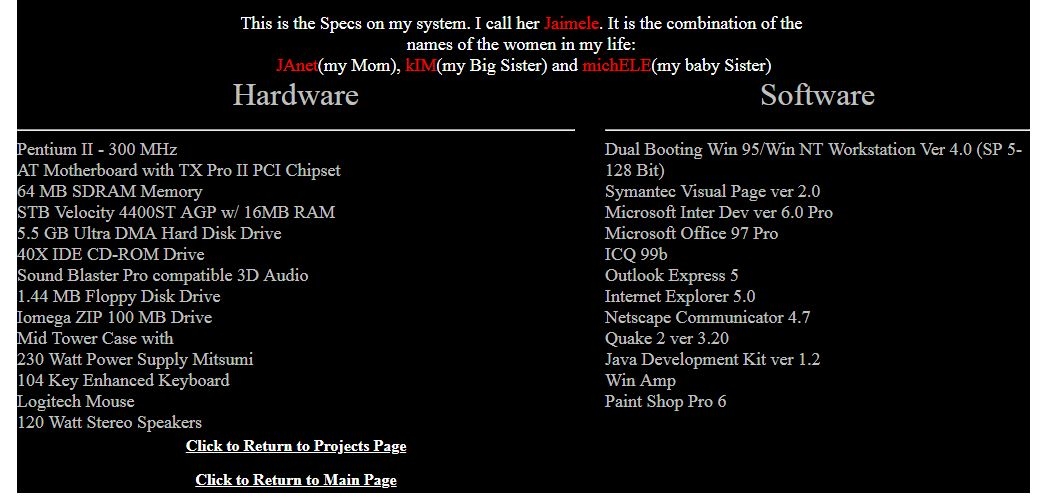My feelings when it comes to building systems is that you at certain times, use legacy/old/slow hardware. If you can get it working ok and to your needs, then you can move it to newer/faster iron. By that time, it will be optimized and worth the initial effort.
Category Archives: #Islandgeek
A cool idea – A built-in wall vacuum
Part of a future project !
Solution for Self Driving cars in the Caribbean
This is a good first step towards autonomous vehicles on the challenging road infrastructure in the Caribbean.
Synergy on FreeBSD
Got Synergy running on my FreeBSD machine.
- On Server(beastie0-192.168.1.1)
- #pkg install synergy
- edit ~/.synergy.conf
- section: screens
mdia-PC:
beastie0:
endsection: aliases
beastie0:
192.168.1.1
mdia-PC:
192.168.1.2
endsection: links
mdia-PC:
down = beastie0
beastie0:
up = mdia-PC
end
- section: screens
- synergys
- On Client(mdia-PC-192.168.1.2)
- #pkg install synergy
- synergy 192.168.1.1
Source Code for my UVI senior research project – Back in 2000 !!
Here is the source code for my senior research project on Genetic Algorithms from back in 2000. Amazing !!
/*
Copyright 2000 Stanford Mings
Redistribution and use in source and binary forms, with or without modification, are permitted provided that the following conditions are met:
1. Redistributions of source code must retain the above copyright notice, this list of conditions and the following disclaimer.
2. Redistributions in binary form must reproduce the above copyright notice, this list of conditions and the following disclaimer in the documentation and/or other materials provided with the distribution.
3. Neither the name of the copyright holder nor the names of its contributors may be used to endorse or promote products derived from this software without specific prior written permission.
THIS SOFTWARE IS PROVIDED BY THE COPYRIGHT HOLDERS AND CONTRIBUTORS “AS IS” AND ANY EXPRESS OR IMPLIED WARRANTIES, INCLUDING, BUT NOT LIMITED TO, THE IMPLIED WARRANTIES OF MERCHANTABILITY AND FITNESS FOR A PARTICULAR PURPOSE ARE DISCLAIMED. IN NO EVENT SHALL THE COPYRIGHT HOLDER OR CONTRIBUTORS BE LIABLE FOR ANY DIRECT, INDIRECT, INCIDENTAL, SPECIAL, EXEMPLARY, OR CONSEQUENTIAL DAMAGES (INCLUDING, BUT NOT LIMITED TO, PROCUREMENT OF SUBSTITUTE GOODS OR SERVICES; LOSS OF USE, DATA, OR PROFITS; OR BUSINESS INTERRUPTION) HOWEVER CAUSED AND ON ANY THEORY OF LIABILITY, WHETHER IN CONTRACT, STRICT LIABILITY, OR TORT (INCLUDING NEGLIGENCE OR OTHERWISE) ARISING IN ANY WAY OUT OF THE USE OF THIS SOFTWARE, EVEN IF ADVISED OF THE POSSIBILITY OF SUCH DAMAGE.
#include
*/
#include <stdlib.h>
#include <stdio.h>
#include <string.h>
#include <ctype.h>
#include <time.h>
struct generation
{
int string[5][10];
int fitness[5];
};
void showgeneration(struct generation gp);
void updatefitness(struct generation *gp);
void makepopulation(struct generation *gp);
void reproduce(struct generation *gp);
void savebest(struct generation *gp, int best[10]);
void replacebest(struct generation *gp, int best[10]);
void mutategeneration(struct generation *gp)
{
int or,rm,m,v=2,p=0,mod=0;
/*
for(m=0;m<5;m++)
{
for(v=0;v<10;v++)
{
rm=rand()%55;
// rm=1;
if ((rm==p)&&(mod<10))
{
(*gp).string[m][v]=(rm)%3;
printf(“Mutation at string #%d”,m);
printf(” and element #%d”,v);
printf(” with it being changed to %d”,rm%3);
printf(” !!\n”);
mod++;
}
p++;
}
}
*/
// srand(time(NULL));
for (p=0;p<v;p++)
{
rm=rand()%50;
mod=rand()%3;
or=(*gp).string[rm/10][rm%10];
(*gp).string[rm/10][rm%10]=mod;
// printf(“\n Printing sting %d at point %d from %d to %d”,rm/11,rm%11,or,mod);
}
// printf(“\n”);
}
void reproduce(struct generation *gp)
{
int m,v,f,g,k;
int val[5];
struct generation newgp;
val[0]=(*gp).fitness[0];
k=(*gp).fitness[0];
for(m=1;m<5;m++)
{
k+=(*gp).fitness[m];
val[m]=(*gp).fitness[m]+val[m-1];
}
for (m=0;m<5;m++)
{
g=rand()%k;
f=0;
while(val[f]<g)
f++;
for(v=0;v<10;v++)
newgp.string[m][v]=(*gp).string[f][v];
}
(*gp)=newgp;
}
void savebest(struct generation *gp,int best[10])
{
int bst,v,m,k;
bst=(*gp).fitness[0];
v=0;
for(m=1;m<5;m++)
if (bst<(*gp).fitness[m])
{
v=m;
bst=(*gp).fitness[m];
}
for (k=0;k<10;k++)
best[k]=(*gp).string[v][k];
}
void replacebest(struct generation *gp,int best[10])
{
int v,m,k,d;
v=rand()%5;
// printf(“\n Replacing %d \n”,v);
for (k=0;k<10;k++)
(*gp).string[v][k]=best[k];
}
void makepopulation(struct generation *gp)
{
int d,v,j,sum=0,m,s,p=0,rpick[5],st[5],fn[5];
struct generation gtemp=(*gp);
int newpop[5];
for(m=0;m<5;m++)
sum=sum+(*gp).fitness[m];
d=0;
j=0;
while (d<5)
{
st[d]=j;
fn[d]=j+(*gp).fitness[d];
j=(*gp).fitness[d]+j;
d++;
}
for(m=0;m<5;m++)
rpick[m]=rand()%sum;
for (m=0;m<5;m++)
for(p=0;p<5;p++)
if((rpick[m]>=st[p])&&(rpick[m]<fn[p]))
newpop[m]=p;
for (p=0;p<5;p++)
for(v=0;v<10;v++)
(*gp).string[p][v]=gtemp.string[newpop[p]][v];
/*
for(p=0;p<5;p++)
{
printf(“\n String #%d”,p);
printf(” New String #%d”,newpop[p]);
}
printf(“\n”);
scanf(“%d”,&p);
*/
updatefitness(gp);
}
void xovergeneration(struct generation *gp)
{
int stg1,stg2,xpoint,xlen,m,xver[10];
stg1=rand()%5;
stg2=rand()%5;
while (stg2==stg1)
stg2=rand()%5;
xpoint=rand()%8;
// printf(“\n Xpoint =%d and Xlen= %d”,xpoint, xlen);
xlen=1+(rand()%8);
// printf(“\n Xpoint =%d and Xlen= %d”,xpoint, xlen);
while((xlen+xpoint)>=10)
xlen=1+rand()%8;
// printf(“\n Xpoint =%d and Xlen= %d”,xpoint, xlen);
// xpoint=2;
m=xpoint;
while(m<(xpoint+xlen))
{
xver[m]=(*gp).string[stg1][m];
m++;
}
m=xpoint;
// showgeneration(*gp);
while(m<(xlen+xpoint))
{
(*gp).string[stg1][m]=(*gp).string[stg2][m];
(*gp).string[stg2][m]=xver[m];
m++;
}
/* printf(“\n The xchange points are from element #%d”,xpoint);
printf(” to #%d”,xlen+xpoint);
printf(” for strings %d”,stg1);
printf(” and %d”,stg2);
printf(“\n\n”); */
// scanf(“%d”,stg2);
// updatefitness(gp);
// showgeneration(*gp);
}
void reproducegeneration(struct generation *gp)
{
int xpoint,m,v,hfit1,hfit2,lfit,lstring,stg1,stg2,xver[10];
hfit1=0;
hfit2=0;
lfit=22;
lstring=0;
for (m=0;m<5;m++)
{
if (hfit1<(*gp).fitness[m])
{
hfit1=(*gp).fitness[m];
stg1=m;
}
// srand(stg1);
}
stg1=rand()%5;
while(stg2==stg1)
stg2=rand()%5;
for(m=0;m<5;m++)
if (lfit>(*gp).fitness[m])
{
lfit=(*gp).fitness[m];
lstring=m;
}
/* This code here needs to be updated so that it will set the fitness to the
strings of the highest values(2) including those strings that have the
same value
*/
/* for(m=0;m<5;m++)
{
if ((hfit2<(*gp).fitness[m])&&((*gp).fitness[m]!=hfit1))
{
hfit2=(*gp).fitness[m];
stg2=m;
}
}
*/
// xpoint=rand()%10;
xpoint=5;
// printf(“\nS1 =%d”,lstring);
// printf(“\nL =%d”,lfit);
// printf(“\nXpoint=%d”,xpoint);
// printf(“Bad string = %d”,lstring);
// printf(“\n first string = %d”,stg1);
// printf(“\n second string = %d”,stg2);
//
// showgeneration((*gp));
m=0;
while(m<10)
{
if (m>xpoint)
(*gp).string[lstring][m]=(*gp).string[stg2][m];
else
(*gp).string[lstring][m]=(*gp).string[stg1][m];
m++;
}
updatefitness(gp);
// printf(“Bad string = %d”,lstring);
// printf(“\n first string = %d”,stg1);
// printf(“\n second string = %d”,stg2);
// showgeneration((*gp));
}
void showgeneration(struct generation gen)
{
int m,v;
for(m=0;m<5;m++)
// printf(“\n—————-\n”);
{
for(v=0;v<10;v++)
{
printf(“%d”,gen.string[m][v]);
printf(” “);
}
printf(“|=%d”,gen.fitness[m]);
printf(“\n”);
}
printf(“\n”);
// scanf(“%d”,&v);
}
void findgoal(struct generation gen,int s)
{
int p,m;
for(m=0;m<5;m++)
if (gen.fitness[m]>=20)
{
printf(“\n\nFINISH !!!!\n Generation =%d”,s);
printf(“\n”);
showgeneration(gen);
scanf(“%d”,&p);
}
}
void updatefitness(struct generation *gp)
{
int f,m,v;
for (m=0;m<5;m++)
{
f=0;
for (v=0;v<10;v++)
f=f+(*gp).string[m][v];
(*gp).fitness[m]=f;
}
}
struct generation populate()
{
int m,v;
struct generation popg;
for (m=0;m<5;m++)
for (v=0;v<10;v++)
// popg.string[m][v]=rand();
popg.string[m][v]=rand()%3;
return popg;
}
void main()
{
struct generation gen[5000000],geno;
int s,m,rm,in,g;
int best[10];
struct tm tim;
time_t timet;
unsigned seed;
timet=time(NULL);
// printf(“Please enter seed :%d”,timet);
// scanf(“%u”,&seed);
// seed=904;
seed=timet;
srand(seed);
gen[0]=populate();
updatefitness(&gen[0]);
// printf(“Please enter mutation factor : %d”,tim.tm_min);
// scanf(“%d”,&rm);
// rm=10;
printf(“\nEnter the # of generations (1-5000000) :”);
scanf(“%d”,&g);
// g=5000000;
printf(“\nShow generations ?(1 for yes, 0 for no) :”);
scanf(“%d”,&s);
// s=0;
printf(“\n\n Searching…….\n”);
for(m=0;m<g;m++)
{
// printf(“Generation %d”,m);
// printf(“\n”);
// showgeneration(gen[m]);
// seed=time(NULL);
// srand(seed);
// showgeneration(gen[m]);
savebest(&gen[m],best);
reproduce(&gen[m]);
updatefitness(&gen[m]);
// showgeneration(gen[m]);
// makepopulation(&gen[m]);
// updatefitness(&gen[m]);
mutategeneration(&gen[m]);
updatefitness(&gen[m]);
xovergeneration(&gen[m]);
updatefitness(&gen[m]);
replacebest(&gen[m],best);
updatefitness(&gen[m]);
// reproducegeneration(&gen[m]);
// updatefitness(&gen[m]);
if (s==1)
showgeneration(gen[m]);
// printf(“\n”);
// reproducegeneration(&gen[m]);
// makepopulation(&gen[m]);
findgoal(gen[m],m);
// printf(“\n”);
// scanf(“%d”,&in);
// printf(“\n”);
if ((m+1)!=g)
gen[m+1]=gen[m];
}
}
Specs for my first self-funded computer
This was on my UVI student web-server website. Amazing how long I have come.

FreeBSD 11.1 on the desktop
So I made the jump to using FreeBSD on the desktop and it’s beginning to grow on me. Some notes.
- I got the Nextcloud client running after running into a bunch of issues with Qt5. This now allows me to keep my files in sync and makes the time on my BSD box that much more productive. Workflow is now enhanced.
- Using XFCE as my desktop with Compiz as a windows manager. I fell in in love with the cube multidesktop feature when I saw it at a Linuxworld years ago.
- Now that I am doing things mostly from the terminal, it gives me the incentive and environment to automate more and more.
- Have to look into some other browsers beyond Chromium and Firefox.
- Once I have rdesktop and xfreerdp, I can manage my MS Windows systems without much issues.
- My previous setup was a Win7 system with 3 monitors. While I could use the same 3 monitors, I realized having 12 (3*4) desktops may have been a bit too much. So now I have two monitors and thus 8 desktops. A major jump in productivity
All in all, a challenging experience, but one that I am glad I did.
The TODO list
- ZFS file system
- Custom launcher(s)
- Custom dashboard
Great book that I am reading: “Bullshit Jobs: A Theory”
This book by David Graeber should be read by technologist and anyone who is interested in systems and processes.
My voice communications configuration
Spent some time, but I got my voice communications system up. Tested it and now feel confident that I can stay in touch, wherever I am in the globe, at least wherever there is a GlobalStar Satellite coverage.
My configuration is this :
Hardware/Services :
- Sprint Samsung S7 Smartphone
- 8×8 Polycom Handset
- AT&T Prepaid ZTE Z22 Flip phone( I love the ability to flip the phone to end the call)
- GlobalStar Qualcomm GSP-1600 Satellite handset
- Computer with Internet Access (I use an AT&T Mifi hotspot)
My Sprint phone number is linked with my Google Voice account. For this, you have to have a number with an area code in one of the 50 states. I haven’t tried Puerto Rico.
This linking gives you a lot of features. The most important one is the ability to forward calls to verified phone numbers. In my case, I have a SkypeIn #, an 8×8 phone service, and a GlobalStar Satellite phone. With this feature, calls coming to my Sprint #, ring on all these devices.
To make use of a prepaid GoPhone for use on the AT&T service, I configured the SkypeIn number to forward to the local AT&T number. I wanted this configuration, because when I travel to a location outside of the US, I can just get a local number and then configure Skype to forward to this number.
Is this configuration expensive ? Yes ! However, what is more expensive, is the lack of communications in my line of business.
Over time, I will figure out ways of optimizing this configuration for both cost and dependence on various service providers.

I build for me….
I build tools for my use. Hardware, Software, and services. I build not to sell, rent and/or give to others. One cannot solve the problems of others, until she can solve her own.
While I am supporter of Free Software, both beer and freedom, I most importantly support the freedom to do what you want. This is because I don’t want anyone telling me what to do with my life.
If I follow your instructions, know that it is because I deem it in my own best interest. Our goals have been aligned. Nothing more, nothing less.